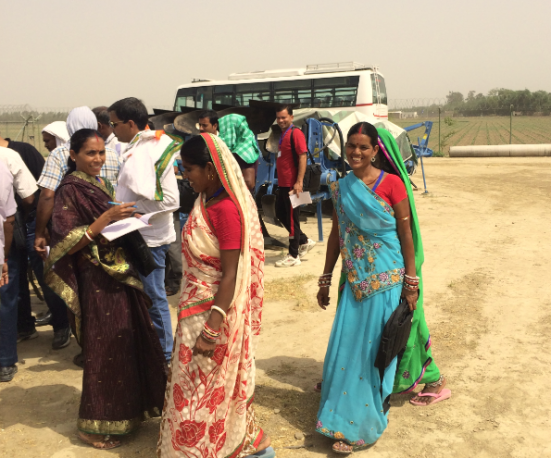Cross-posted from the FSP India website written by Jaspreet Aulakh

Jaspreet Aulakh, IFPRI
In May 2016, a conference was organized by the International Food Policy Research Institute (IFPRI) and Rajendara Agricultural University (RAU) to discuss how to best promote large-scale agricultural mechanization in the state of Bihar. The challenges to mechanization in the state include small landholdings; the high cost of renting farm equipment, particularly for smallholder farmers; low agricultural output and subsequent low incomes; and lack of access to credit and financing.
One recommendation that came out of the dialogue was the improvement of Custom Hiring Centers in the state. As highlighted during the discussions, Custom Hiring Centers can play a key role in increasing smallholders’ access to affordable, quality rental equipment. However, these centers are relatively new to Bihar and are not widely available. The dialogue participants agreed that Custom Hiring Centers need to be well-planned and promoted and should include roles for individuals, self-help groups (SHGs), and the corporate sector.
A second recommendation regarded the need to better train Bihar’s farmers to use rented farm equipment to improve their productivity. RAU and IFPRI agreed to train local farmers and service providers from Bihar on how to manage rental farms, in collaboration with Zamindara Farm Solutions. Twenty farming households from Bihar, as well as two households from Nepal, participated and were introduced to Zamindara’s custom hiring model.
The training was conducted from June 13-17 in Punjab and focused on the mechanization of sowing operations in paddy, pulses, and maize crops, which form the bulk of agriculture in Bihar state. Participants were introduced to the use of rental operations as business models and to the use of machines such as cultivators, disc-harrows, sub-soilers, ridge planters and pneumatic planter for maize, and irrigation technology such as water guns and drip irrigation. Farmers were also trained on direct rice seeding practices, manual sowing, and paddy transplanters. There was also session on high-tech farm implements and the use of pneumatic planters in pulses.
Amar Singh, Agriculture Development Officer (ADO) of the Department of Agriculture Punjab, discussed best practices to use for higher production, highlighting the fact that machines and other farming inputs must be used under specific guidelines to be effective; for example, rotavators should not be used for soils, as it breaks the soil particles. He also emphasized that the use of machinery and other inputs, particularly pesticides and fertilizers, must be tailored to each state’s unique agro-ecological conditions. He cautioned farmers against simply copying preventive and curative practices from other regions, as this could lead to ineffective practices, soil degradation, and further loss of productivity and income.
The training included several female farmers who own 1-2 acres of land and conduct most of the farm management activities. These women stated that they are currently using only manual labor for all farm operations, and that this training was the first time they were made aware of the many machines available for farm labor.
In addition to the more formal training, participants had the opportunity to visit Biomass Plant in the village of Channo; this is the largest biomass plant in Punjab, with the capacity to generate 14.5 MW electricity. The plant sells the electricity it generates to the government of Punjab and uses a wide range of sources of biomass to feed its broiler. Paddy straw acts as major source of fuel, and local farmers who sell their paddy straw to the plant rather than burning it themselves make 1250 Rs (20 USD) per ton of straw. This use of paddy straw was introduced to the participants as a way to increase their incomes through mechanization, even if they do not own or rent the machines themselves.
On the final day of the training, farmers had the opportunity to discuss their farm-specific challenges one-on-one with Vikram Ahuja, Director of Zamindara Farm Solutions. Ahuja assured the farmers that his organization will help them create the reports needed to apply to banks for credit for farm rental equipment. Farmers were provided with print-outs of all the government schemes available through the Bihar government that they can use to help them gain access to machinery and inputs and improve their farms’ productivity.
Future steps include setting up four or more rental centers with used machines; the aim is for each center to have two tractors, two laser levelers, two rotavators, and two harvesters. The farmers also requested that experts be sent to Bihar to help them better understand the state’s agro-ecological conditions.



